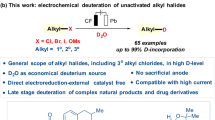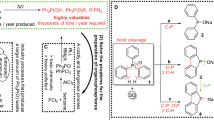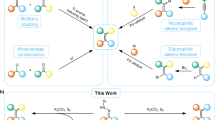Abstract
TRITYLMETHYL chloride, Ph3C.CH2.Cl, has interesting structural features, especially from the point of view of investigations of reaction mechanism1. We wish to record briefly the preparation, properties and reactions of this compound, and to refer to some related halides. The substance previously listed in the literature2 as tritylmethyl chloride is triphenylchloroethylene, Ph2C=C(Cl)Ph.
This is a preview of subscription content, access via your institution
Access options
Subscribe to this journal
Receive 51 print issues and online access
$199.00 per year
only $3.90 per issue
Buy this article
- Purchase on Springer Link
- Instant access to full article PDF
Prices may be subject to local taxes which are calculated during checkout
Similar content being viewed by others
References
Dostrovsky, Hughes and Ingold, J. Chem. Soc., 173 (1946).
Cone and Robinson, Ber., 40, 2160 (1907). cf. Wooster and Mitchell, J. Amer. Chem. Soc., 52, 1042 (1930).
van de Kamp and Sletzinger, J. Amer. Chem. Soc., 63, 1879 (1941).
Author information
Authors and Affiliations
Rights and permissions
About this article
Cite this article
CHARLTON, J., DOSTROVSKY, I. & HUGHES, E. Triphenylchloroethylene, Tritylmethyl Chloride and Related Halides. Nature 167, 986–987 (1951). https://doi.org/10.1038/167986b0
Issue Date:
DOI: https://doi.org/10.1038/167986b0
This article is cited by
Comments
By submitting a comment you agree to abide by our Terms and Community Guidelines. If you find something abusive or that does not comply with our terms or guidelines please flag it as inappropriate.



